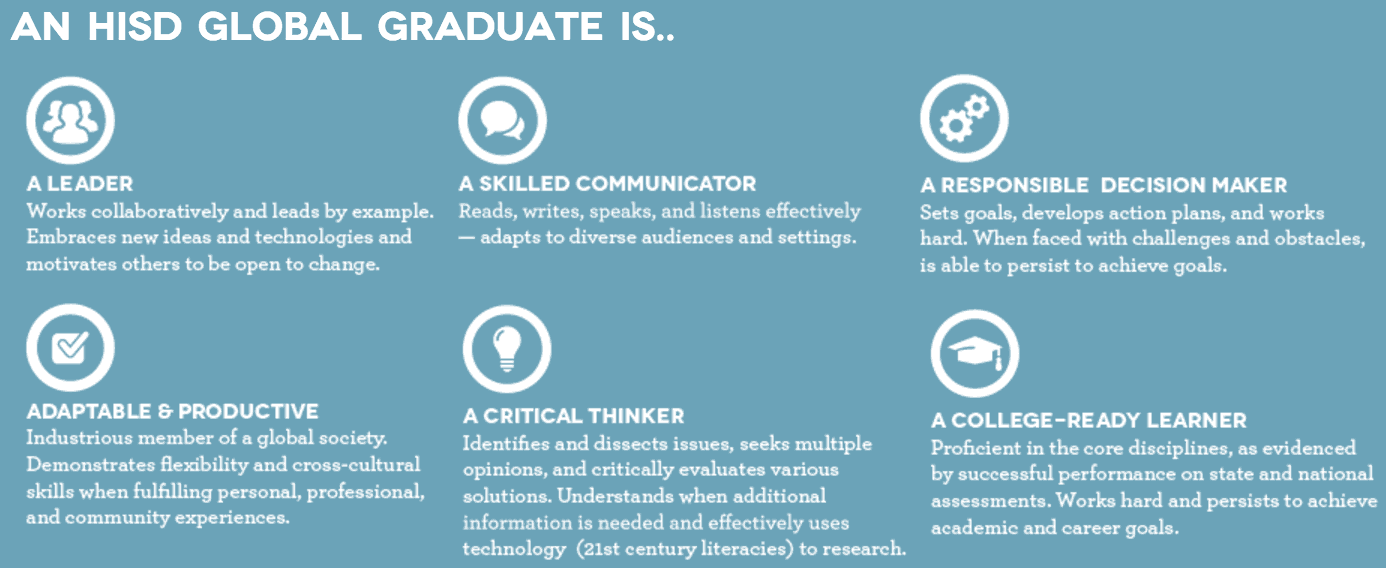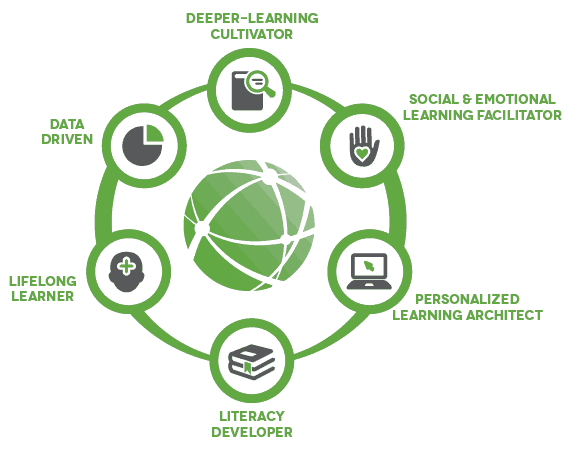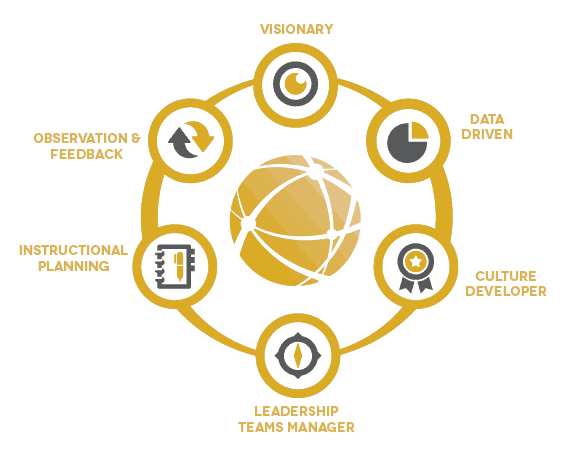How Houston Schools Are Making it a Great Global City

Houston has been called the next great global city. That was before Houston embraced the latest round of war refugees while much of the rest of the state and country put up barriers.
“Houston, unlike other cities, is insanely entrepreneurial and optimistic. It incubates the hell out of new ideas,” said nonprofit leader Rhetta Detrich.
A big part of putting Houston on this positive global trajectory has been great progress in Houston area schools, both districts and charter networks.
Improving Houston ISD
In 2010, Superintendent Terry Grier called Harvard’s Roland Fryer who had just published a report outlining the five factors that contribute the most to the success of high performing school networks. These factors became the backbone of the Houston turnaround effort called Apollo 20: focus on human capital, culture of high expectations, use data to improve instruction, extend time on task, and high dosage tutoring. Progress has been promising.
In 2013, HISD committed to providing laptops to every high school student through the PowerUp initiative. The project was so well planned we featured it in our Guide to EdTech Procurement. The Learning Accelerator said, “HISD’s approach combined thoughtful goal setting, thorough planning and robust support.”
HISD also has a globally themed online professional development and a customized digital badging system. Since last August, more than 1,800 HISD teachers in 55 schools have earned 4,300 badges (that’s ~ 43,000 hours of global PD). There is no other large-scale digital badging effort for K-12 educators right now. This post by Terry Grier summarizes the digital badging work well and we also highlighted digital badging for global educators here.
Three years into PowerUp, superintendent Grier summarized three lessons:
- Purpose and vision must be aligned with student goals: It was critical that PowerUp not be in isolation from the academic goal to propel global graduates (discussed below);
- Challenging traditional systems can spur innovation: PowerUp pushed us to collaborate more to better support schools and teachers.
- It is not about the tool, it’s about powerful learning: We are working together to use technology so that our classrooms remain student-centered and students become critical thinkers, problem-solvers, and leaders — all traits of the Global Graduate.
Creating Global Grads
To address this challenge, we created a profile of the HISD Global Graduate with the assistance of diverse stakeholders. This profile defines the knowledge, skills, and characteristics we believe are critical for student success. With this foundation, all the district’s initiatives, including PowerUp, are aligned with the goals represented by the Global Graduate profile.
Preparing Global Grade
As Houston became more diverse and as global trade became increasingly important to the economy superintendent Grier initiated development of a updated graduate profile that defined the knowledge, skills, and characteristics critical for student success. With the help of community, business, and HigherEd partners, HISD developed a Global Graduate profile with six attributes: leadership, communication, responsible decision making, adaptability and productivity, critical thinking, and college-ready.

- Focus on Literacy: HISD emphasizes reading and writing competencies across subjects.
- Dual Language: HISD has doubled the number of its Dual Language programs, allowing students to spend a portion of their day learning in English and the rest of the day immersing themselves in culture and languages such as Mandarin Chinese, Arabic, and Spanish.
- Modern schools: In 2012, HISD passed the largest bond in Texas history, which will ensure 40 schools — mostly high schools — will offer modern learning spaces that support emerging technology and contemporary teaching practices.
- Technology: By this fall all high school students will be learning on district-issued laptops they can use at school and at home with access to a powerful personalized learning platform.
- Professional development: Teachers receive the professional development they need to support personalized learning.
- College and career readiness: HISD is combining core academics with career-based knowledge and skills in collaborative and research-intensive learning environments. AP courses are offered at every high school, and more students than ever are passing their AP exams. More students have access to work-based experiences and certifications.
- Early College High Schools. HISD was the first district in Texas to pioneer the concept of an early college high school where students have the opportunity to earn an associate’s degrees.
Talent Development
In addition to a lot of facilities modernization, superintendent Grier said, “The most important building that has been going on in HISD’s ecosystem is in developing our human capital. We know that our 21st century campuses are only as good as the principals who lead them and the teachers who create magic in each classroom.” For that reason, Grier’s team enacted bold initiatives to hire and retain the most effective educators possible.
Houston’s effort to recruit and develop great educators was highlighted in Smart Cities as the best regional example of talent development in the country–a tribute to HISD and surrounding districts, world class charter networks, great nonprofit partners, and responsive HigherEd institutions.
HISD created profiles of effective teachers and leaders. Like the HISD Global Graduate profile, each contains a list of characteristics or competencies.

HISD Teacher Profile
In order to ensure all HISD students are Global Graduates and ready for the world, teachers must provide them access to personalized learning opportunities that allow them to develop the skills needed to succeed in today’s global economy.

HISD Leader Profile
HISD must ensure that every school is led by an effective principal who creates an instructional learning environment on their campus that allows students to develop the skills needed to compete in today’s global economy.
Houston won the 2013 Broad Prize, a recognition for the large urban school district that has made the greatest improvement in student achievement in recent years. That recognition didn’t include any of the innovation agenda highlighted in this post (It’s also worth noting that Houston-based YES Prep was the inaugural winner of the Broad Prize for Charters).
Next month Dr. Grier will step down as Houston superintendent after a great seven year run. Achievement and college going rates are up and dropout rates are down. Buildings and academic programs were modernized. For urban education in America, Houston ISD is as good as it gets.
Dr. Grier was the 2014 winner of the Council of the Great City Schools Urban Educator of the Year. Terry’s legacy spans beyond the 20 years as a big district superintendent, his proteges are superintendents in a dozen districts nationwide.
Houston is rapidly becoming a great global city. Houston schools are a big part of the success story and for that Terry Grier deserves a lot of credit.
For more check out:
- Houston, Texas | A Growing Center for DIY Innovation
- Houston: As Good as it Gets
- Celebrating Success: A Snapshot of EdTech Procurement in Houston
Stay in-the-know with all things EdTech and innovations in learning by signing up to receive the weekly Smart Update.





0 Comments
Leave a Comment
Your email address will not be published. All fields are required.